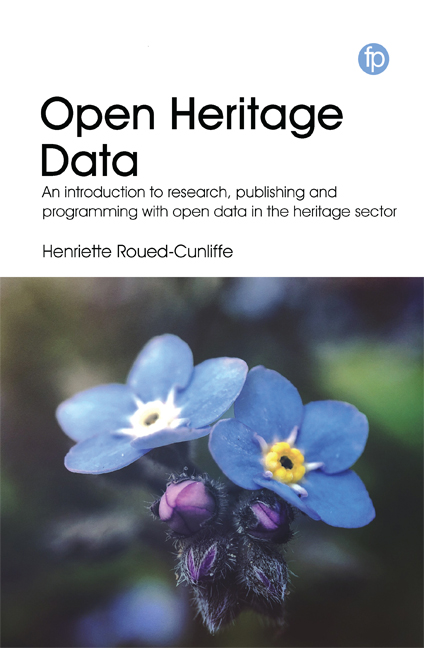 Open Heritage Data
Open Heritage Data Book contents
- Frontmatter
- Dedication
- Contents
- List of Case Studies, Figures and Tables
- List of Abbreviations
- Acknowledgements
- Preface
- Introduction
- 1 Openness in Heritage
- 2 Sharing Legally
- 3 Publishing Open Data
- 4 Using and Reusing Open Data
- 5 Visualising Open Data
- 6 Combining Open Data
- 7 Open Data for Research
- Appendix A Examples Used in the Book
- Appendix B Introduction to Coding
- References
- Index
1 - Openness in Heritage
Published online by Cambridge University Press: 23 July 2020
- Frontmatter
- Dedication
- Contents
- List of Case Studies, Figures and Tables
- List of Abbreviations
- Acknowledgements
- Preface
- Introduction
- 1 Openness in Heritage
- 2 Sharing Legally
- 3 Publishing Open Data
- 4 Using and Reusing Open Data
- 5 Visualising Open Data
- 6 Combining Open Data
- 7 Open Data for Research
- Appendix A Examples Used in the Book
- Appendix B Introduction to Coding
- References
- Index
Summary
From my own perspective, OHD is not so much a technical issue but, rather, about data access being the current frontier in a long line of attempts to open up heritage to a wider group of people. This is the main goal for many GLAM institutions and the people who work in them: to engage a wider population in heritage. This is my goal too, but I do not believe that the heritage community is currently reaching its full potential in this respect. Hence this call to action for OHD.
The introduction examined a number of concepts, among them that of Open Heritage. It is this idea of openness in heritage that is dealt with in this chapter. Before working with the technicalities of OHD it is important that we understand why this is the next step in a long line of both more and less successful attempts to open up heritage.
For me it is not the awe of technology that is the driving force in my longtime interest in this subject. The reason why I work with heritage data is not because today we can make cool, three-dimensional (3D) models and interactive apps. I wish to open up heritage data further, using open data technologies, because it is a vital part of ongoing attempts to open up heritage for all. Many GLAM institutions today have a great focus on being democratic and inclusive. It is time to put those words into action and step up to the latest methods for engagement. It is time to share the raw data, catalogues, images, maps and more that are the basis of these galleries, libraries, archives and museums. Further, it is time for the GLAM sector to band together with the large groups of people working with heritage in their free time. I call them ‘heritage amateurs’, and with the passion and interest that they pour into their work they are the heart of heritage.
I believe the consequences of not doing this would be a loss of relevance to society and a potential loss of revenue from both public and private funding sources. This would be detrimental to the institutions that we expect to protect our heritage for the future.
- Type
- Chapter
- Information
- Open Heritage DataAn Introduction to Research, Publishing and Programming with Open Data in the Heritage Sector, pp. 1 - 24Publisher: FacetPrint publication year: 2019


